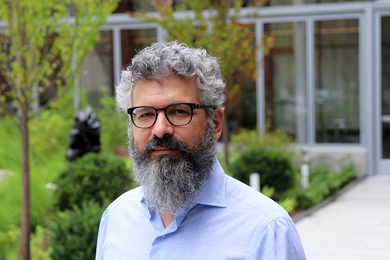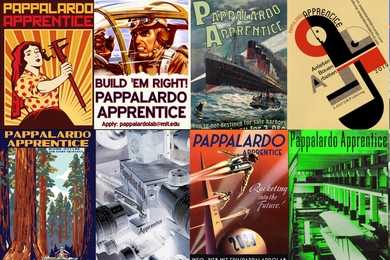Three Nobel laureates in economics, each one a professor emeritus at MIT, drew an overflow crowd in Kresge Auditorium on Monday night to launch the five-year Ford/MIT Nobel Laureate Lecture Series.
Paul A. Samuelson, Franco Modigliani and Robert M. Solow spoke on "The US Economy: The Last 50 Years and the Next 50 Years."
The trio agreed on some topics, such as the impact on the US economy of an aging population, and they cordially parted ways on others. Their collective message to the audience was: This may be as good as it gets.
PAUL SAMUELSON
Professor Samuelson won the Nobel Prize in 1970. He is the author of Economics, a textbook published in 1948 that has been translated into 40 languages.
When Economics was first published, Professor Samuelson predicted that the major problem confronting us "was avoiding the depression-unemployment cycle of the 1930s."
"I was trained by Jesuits in the University of Chicago Church of Free Enterprise," he said. "But I threw off all that brainwashing and reached a more balanced view."
On the one hand, he said, "I saw the effect of 1920s-style capitalism. I grew up in that system. It produced glaring inequalities."
On the other hand, he recalled, "When Senator Joe McCarthy undertook a witch hunt in the 1950s, I suddenly realized what one big employer means. My friends were blackballed. If there were only one employer, there would have been no place for them to hide," Professor Samuelson said.
Thus, the problem confronting us today is, "How to work out the Aristotelian golden mean, to locate that delicate compromise between intervention by the state and 1920s capitalism?" he said.
Professor Samuelson spoke with fervor of "the limited endowment of altruism," noting that any imbalanced economic system -- unfettered free markets, totalitarian states and social democracies in which the tax rates work like "sand in the economic cog wheels" -- can bring out the worst in human nature.
"Altruism should be rationed carefully because it is such a precious resource," he asserted.
ROBERT SOLOW
Professor Solow received the Nobel Prize in economics in 1987. He has written numerous books, including Capital Theory and the Rate of Return (1963), Growth Theory: An Exposition (1970) and The Labor Market as a Social Institution (1990).
The past five decades were "extraordinarily successful in most economic ways," said Professor Solow, who openly relishes his work.
And how good were they for others? By one measure, the past 50 years were terrific: in 2000, consumer spending was three-and-one-half times what it was in 1950.
But the rise in the standard of living was neither smooth nor uneventful. There were cycles of recession and of inflation, he noted, and a growing inequality in the distribution of economic goods.
Sustaining our current standard of living despite a big bulge in the aging population and the persistence of an underclass is the challenge of the next 50 years, he said.
In an era where "nursing homes will become more popular than nursery schools," later retirement would mitigate the aging problem. But later retirement, he acknowledged, is one thing if you happen to delight in your work, and another if you happen to work in a dull, unrewarding job.
The real offset to a smaller working population is higher productivity per worker, he declared. So, other questions for the next 50 years include, "Can productivity be accelerated?"
Professor Solow added, "Productivity growth is over-accounted for by improved education and technology. This suggests we will be lucky if we attain the same growth as in the past 50 years. It also suggests it might be a good idea idea if somebody here majored in something other than EECS."
FRANCO MODIGILIANI
A native of Italy, Professor Modigliani won the 1985 Nobel Prize in economics for his analysis of "life cycle savings."
Professor Modigliani agreed with the "exceptional growth" view of the past 50 years, noting, "the group of people our age were particularly fortunate."
He cited three causes of the growth blast: the stock market, real estate values and Medicare.
"When we were young we never paid. Now, you're paying for us," he quipped. "We'll leave you a large inheritance and that may help. But you are not likely to do so well as us."
Like Professor Samuelson, Professor Modigliani used his own life experience as a resource in his remarks. Contrasting the US with Europe, he asked, "Why is Europe doing so badly?"
"They refuse to read Keynes! They are stupid enough to refuse to believe that the way to cut unemployment is to invest, invest, invest. It is not to raise interest rates!"
Professor Modigliani's view of the future resembled the famous Magritte painting of the man with the big green apple over his head. That apple, the Wall Street bubble, will burst one day, he said.
"When the bubble explodes, there will be unpleasant consequences. The wealth effect has supported the boom and has created a large deficit in the balance of payments.
"We have a gigantic debt. It is conceivable that foreigners will refuse to lend to us at a certain point. They may refuse to buy shares of our companies. If the dollar depreciates, there may be a run as everyone wants to get rid of dollars. At that point, we are no different from Malaysia," he warned.
While the stock market bubble will generate problems in the years ahead, we could help, he assured the crowd. "First, we could save more. We could finance our own investments, a very desirable thing.
"Second, we could change the nature of Social Security from a pay-as-you-go system to one based on a funding system. In a funded system, contributions are used to accumulate wealth and you use that to pay your pension," Professor Modigliani said. His research on Social Security is available on his web site, he told the crowd.
A question-and-answer period led to a reception that consumed much of Kresge Oval. The audience for the economists' panel was a growth bubble in its own right: 1,200 in Kresge and 200 in Little Kresge with the overflow crowd watching the speakers on screens in the Student Center.
The three Nobelists were introduced at the opening of the event by MIT Chancellor Lawrence S. Bacow. Concluding remarks were made by Dr. Martin B. Zimmerman, vice president for governmental affairs, Ford Motor Company.
"I am a former student who received tremendous benefits from studying with these gentlemen," said Dr. Zimmerman (PhD 1975).
For information about other MIT-related Nobel Prize winners, see a special report on the News Office web site.
A version of this article appeared in MIT Tech Talk on September 20, 2000.





